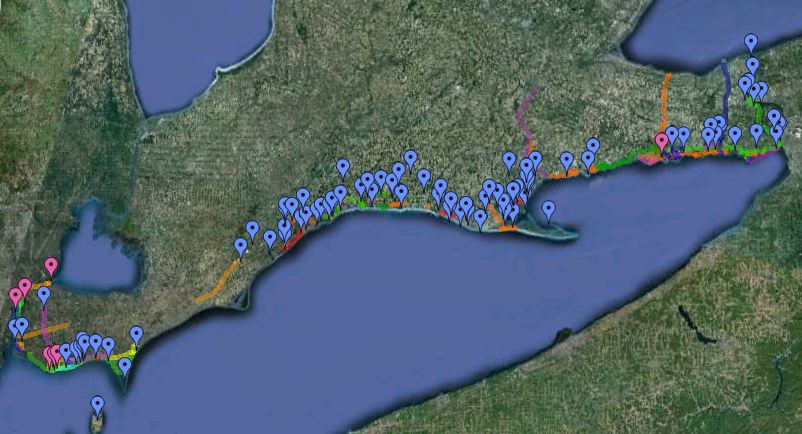Inspired by urgent threats to Lake Erie's landscape, Carolinian Canada and partners are planning a 600 km trail network that will voluntarily bring together citizens, governments and industry, young and old, resident and tourist, rural and urban, to connect with the nature and culture of the coast.
The EcoTrail's ultimate aim is to serve as a catalyst in promoting better overall understanding and care of the Lake Erie shoreline and associated river valleys and natural communities.
2009
In 2009, Carolinian Canada launched the EcoTrail concept at the Caring for Our Coast Forum. Participants spent two days envisioning a Lake Erie community trail network, and the forum was a great success.
Later in 2009 our Coastal Coordinator produced two factsheets describing the coast and the goals of the Trail project. These factsheets are available in our “Shop” as a free download.
2010
In 2010, Carolinian Canada focused on stakeholder consultation and community engagement. Carolinian Canada staff interviewed experts, talked with youth, and held workshops with community members. Carolinian Canada was eager to engage all those interested in the vision of a coastal trail, held six workshops in communities along Lake Erie, and created a virtual workshop on our website so that people could provide feedback online.
Between staff research, expert interviews and workshop feedback, anastounding amount information and good ideas were collected in 2010.

This map illustrates the site and trail route feedback we received from four of the six workshops conducted in 2010.
Click here to find the full list of current sites
2011
In 2011, Carolinian Canada partnered with many organizations and once again hosted workshops and presentations in many communities along Lake Erie’s shore – 10 events in total!
Some events were led by Carolinian Canada and others were led by partners such as the Waterfront Regeneration Trust. A few of the events were geared toward “Leaders” and engaged municipalities, conservation authorities and parks who manage large areas of the coast. Other events were open to the general public and volunteers. In total, 318 individuals attended the events and were able to provide information, make decisions and engage others to become involved in the proposed trail.
In September, the Waterfront Regeneration Trust led a mobile workshop with the intent of testing the proposed Lake Erie cycling trail, a route they developed with partners (including CCC) earlier in the year. Through this workshop, the entire route was tested by dozens of cyclist, planners and politicians and a final route was developed from on-the-ground observations by riders. Riders, in general, spoke very highly of the cycling route. CCC was featured as a key partner, throughout the workshop with presentations by staff and volunteers.
2012
